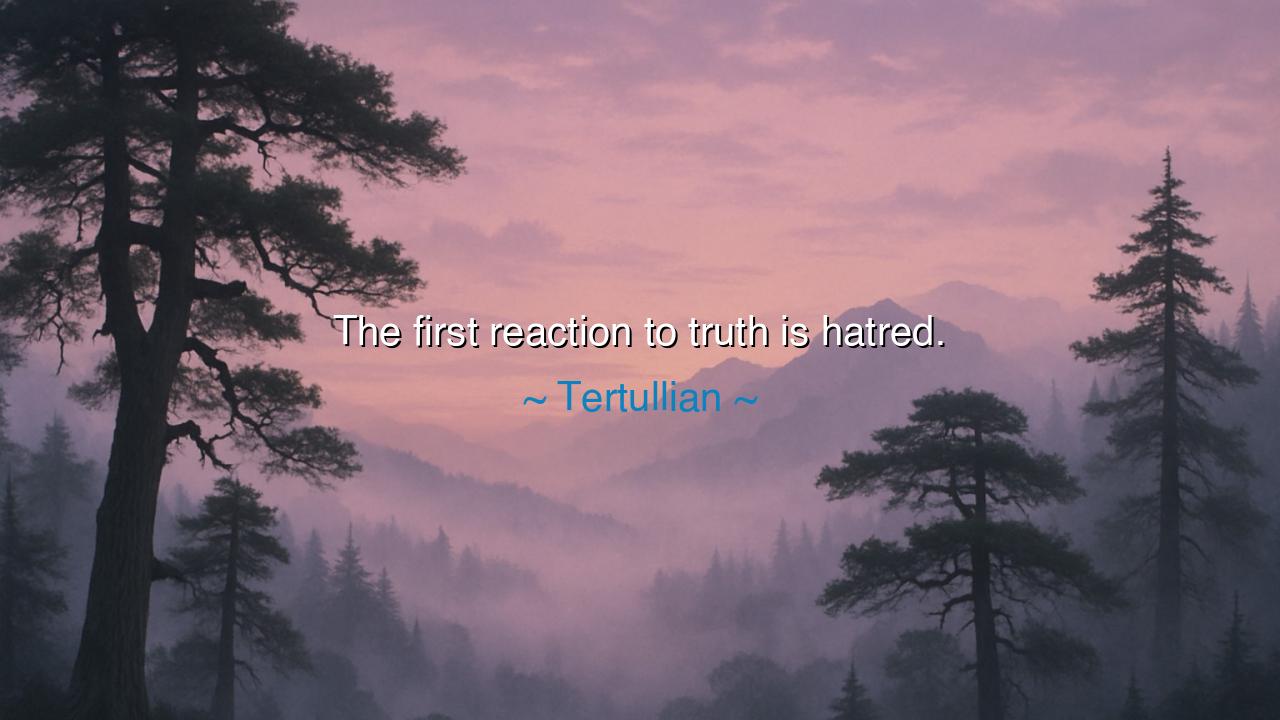
The first reaction to truth is hatred.






Tertullian, the fiery Christian thinker of the early centuries, declared with burning clarity: “The first reaction to truth is hatred.” In this short sentence, he captured the storm that erupts when light first pierces the darkness. For truth is a mirror, and when it shows people not only what is noble but also what is corrupt within them, the heart recoils. Few welcome the sharp sting of revelation; more often, the first impulse is to reject it, to lash out against the one who dares to speak it. Thus, hatred often greets the herald of truth before respect or gratitude is born.
Tertullian spoke from the furnace of his age. Living in Carthage in the second and third centuries, he defended a faith that was despised and persecuted. To proclaim Christianity was to proclaim that idols were false, that emperors were not gods, that the mighty of Rome were dust before the Eternal. Such truths cut deep into the pride of nations and rulers, and so they provoked hatred. Tertullian himself witnessed how those who carried this message were mocked, imprisoned, and slain—not because their words were false, but because they were unbearably true.
History is filled with this same pattern. When Socrates walked the streets of Athens, asking his piercing questions, he exposed the ignorance of the powerful. The truth he spoke was simple: that wisdom begins with admitting one’s ignorance. Yet the proud men of Athens hated him for it. They condemned him to death, not for lies, but for unsettling the comfortable illusions of their lives. The cup of hemlock became his reward for refusing to abandon the path of truth.
Consider also the life of Galileo. When he revealed that the Earth revolved around the Sun, he shattered long-cherished beliefs. His discovery was not welcomed as light, but resisted as fire. Many in authority met his truth with anger, for it threatened their power and their worldview. Hatred rose before acceptance, and only centuries later did the world embrace what Galileo had seen with his telescope. The first reaction to truth was indeed hatred, but hatred could not erase reality.
This is the weight of Tertullian’s saying: that hatred is often the cloak truth first wears. Human beings cling to lies because lies comfort, flatter, and soothe. Truth, on the other hand, unmasks pride, reveals hypocrisy, demands change. It is rarely embraced immediately, for it wounds before it heals. Yet even if hatred greets it first, truth does not die; it endures until, in time, it is recognized for the liberation it brings.
The lesson for us is clear: if you dare to live by truth, you must be prepared to face hatred. Do not be surprised when honesty offends, when integrity provokes resistance, when the light you shine draws anger before admiration. This is the fate of prophets, thinkers, reformers, and even ordinary souls who refuse to live by falsehood. But though hatred may be the first reaction, truth will, in the end, outlast it.
Practical action flows from this. When you hear a truth that stings, resist the temptation to hate it. Instead, sit with it, reflect, and ask whether it carries wisdom you need. And when you must speak the truth, do so with courage, knowing that rejection may come before acceptance. Stand firm, for your task is not to please but to bear witness.
Thus, Tertullian’s words ring with timeless power: “The first reaction to truth is hatred.” Do not fear this hatred. See it for what it is—the resistance of pride, the trembling of lies before they crumble. If you remain steadfast, hatred will fade, but truth will remain, shining brighter with each generation. For though it may wound, though it may anger, in the end, truth alone sets the soul free.






TTChu Thi Thao
Tertullian’s words raise an interesting point about human nature and our relationship with truth. I wonder if the hatred toward truth comes from the fear of being wrong or the discomfort of having our worldview upended. Is this why people sometimes prefer comforting lies over painful truths? Is it possible that our instinctive reaction of hatred is just a defense mechanism, and over time, we learn to come to terms with the truth?
PMThang Phan Minh
I find this quote both unsettling and thought-provoking. If truth often leads to hatred, what does that say about us as individuals and as a society? Why does something that should bring clarity and understanding stir such negative emotions? Is it because we are afraid of the truth’s consequences, or does it come from an unwillingness to see things differently? How do we move from initial hatred of the truth to acceptance?
UGUser Google
This quote makes me think about how difficult it can be to accept certain truths, especially when they contradict what we’ve believed for so long. Why is the truth often met with hatred or denial? Could it be that people feel threatened by it, fearing that accepting it will require them to change or give up something they hold dear? How can we create an environment where the truth is embraced rather than rejected?
BMBe Mun
Tertullian’s statement struck me because it suggests that the truth is not always welcomed with open arms, but with resistance. It makes me wonder, why do we react with such hostility to the truth? Is it because the truth often challenges our existing beliefs or forces us to confront uncomfortable realities? Can we ever fully accept the truth, or is it human nature to resist it initially?